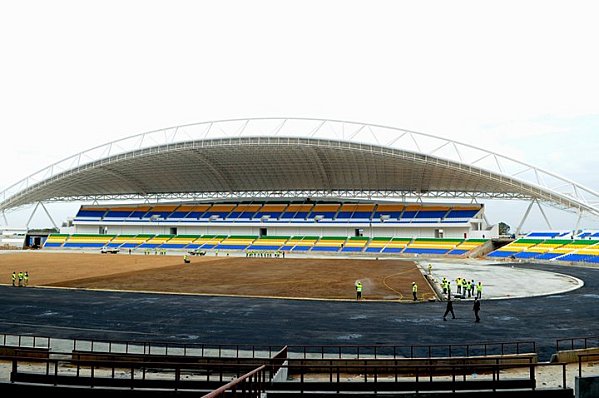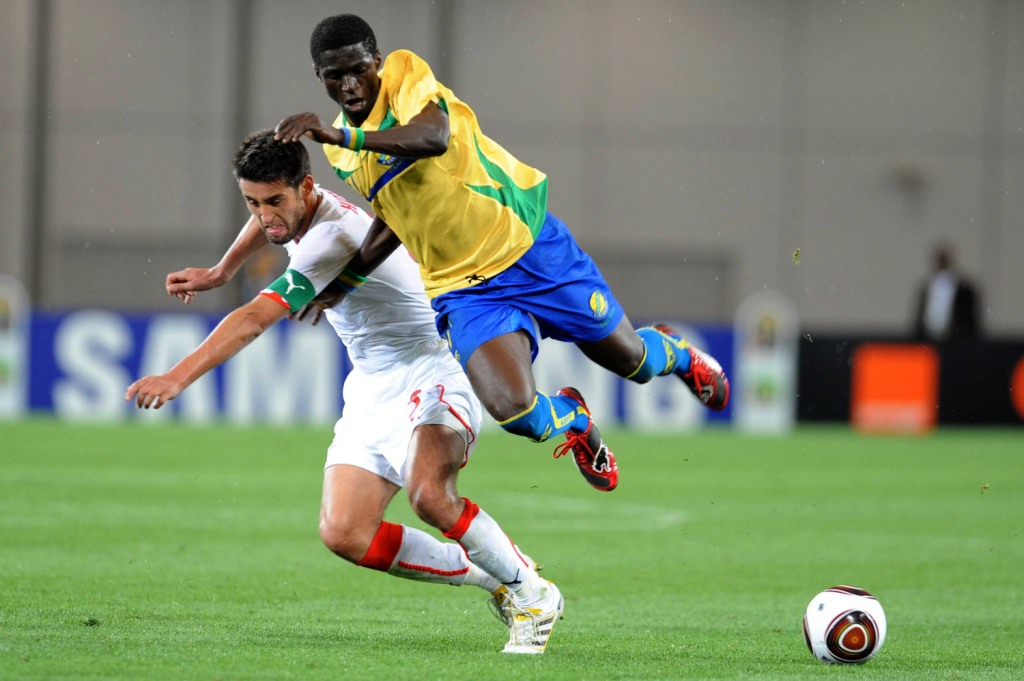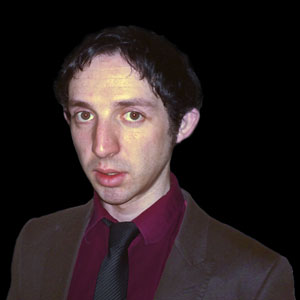When Brazil came to town in November for a friendly at the newly constructed stadium in Libreville, Gabon, the African Nations Cup organisers were hoping it would serve as a useful preparatory exercise ahead of the start of the tournament in January.
It was just as well.
A tropical downpour prior to kick off left the pitch virtually unplayable, whilst the game was delayed by 20 minutes due to a power failure. Though the visitors won 2-0, players such as Sandro, Hernanes and Fábio da Silva spent much of the friendly trying to avoid taking injuries back to their clubs on a pitch which they found difficult to play on.
Gabon can perhaps be excused somewhat, given that they had not played a game at home until Brazil came to town since 2009. The spokesperson of their organising committee for the African Nations Cup, which they are co-hosting with neighbours Equatorial Guinea this month, Louis Claude Moundzieoud, told insideworldfootball that they have been forced to completely relay the pitch.
“The Brazil match on November 10 gave us the chance to test our organisation and the Libreville stadium. This match against Brazil was important for us because we showed to the international community that Gabon is ready,” he says. “The grass was a bit difficult to play on but it has been completely re-laid.”
Almost two months on, and Gabon is now ready, he maintains. The competition gets underway on January 21 in Bata, Equatorial Guinea when the hosts take on Libya, whose participation in the tournament is a remarkable achievement for a set of players living in, and for some taking part in, a civil war for most of the last year. For Gabon, it has been an opportunity to develop sporting and general infrastructure, and they have constructed a stadium in Franceville as well for the competition.

“We have built two new stadiums, one in Libreville and one in Franceville, and also a new training ground complex,” Moundzieoud says. “All the stadiums are ready; all the hotels for the team and media are ready. Now our country is ready to host the African Cup of Nations.”
Tickets are sold out for Gabon’s matches, and their supporters will hope their team can do them proud. The under 23s recently qualified for the Olympic Games in London later this year for the first time, winning the qualifying tournament held in Morocco. Moundzieoud says this proves that they have a good group coming through and that they can go on to repeat the feat of Cameroon and Nigeria in winning previous Olympic Games gold medals.
For the African Cup of Nations, the best the country has previously achieved was a quarterfinal with Tunisia in 1996, where they lost on penalties.
“Gabon has not progressed past the last eight before,” Moundzieoud says. “The national team’s best result until today was in 1996 in South Africa (where they lost in the quarter finals to Tunisia on penalties after a 1-1 draw). I think Gabon can reach the semi final.”
It could be a golden chance to do that too, as a host of big names missed out on the 2012 tournament. Nigeria, Egypt and Cameroon all lost in qualifying, whilst South Africa misunderstood the rules and played for a draw in their final qualifier, which they actually needed to win, thus failing to qualify.

But two of the bigger names to have qualified for this month’s tournament, Tunisia and Morocco, are both in Gabon’s group, alongside Niger, and the possibility of a meeting with Ghana could await in the quarterfinals. Gabon have a talented squad though, with stars such as André Biyogo Poko of Bordeaux, and Pierre Emerick Aubameyang, who has been in excellent form for St Etienne in Ligue 1. And this is a tournament some feel is for the underdogs, even though the Ivory Coast remain heavy favourites. But Moundzieoud insists that the most important thing is staging a good tournament.
They have faced challenges, and not just the state of the pitches. Reuters claim their journalists have had trouble booking rooms and apartments for the tournament, whilst visas are another issue. Fans have been told they will be able to pick up their visa when they land in Gabon, with airlines apparently being ordered by the country to allow supporters to enter the country before picking up the document.
Moundzieoud explains that transport has been upgraded to make life for supporters as easy as possible, with special flights operating between the two host countries every day that there is a match, as well as a plane going from Franceville and Libreville. It’s just as well, as to drive from one to the other takes 12 hours. In total, some 400 billion Francs CFA (€609,000/$788,000) have been invested by Gabon.
“For my country it’s an opportunity to develop infrastructure, sporting, hotels and medical, as well as for communications. We have increased the quality for journalists to work and be able to communicate at an acceptable international standard,” he said.
Moundzieoud explains that hosting the event can show to the world that they are able to stage significant international tournaments. It is the first time the African Cup of Nations will have come to Gabon, and he says that is a “big opportunity to organise a competition like this”.
“For our country this is important, it will give us the opportunity to show the world that our country can organise an international competition…it is important to permit Gabon to show to the entire world that this country can organise a competition like the African Nations Cup,” Moundzieoud says. He adds that it can help them to put their case forward to stage international football tournaments in the future. The World Cup, the pinnacle of the game, is out of reach, but other FIFA competitions such as the Women’s World Cup could be an option, he argues.
“We now have beautiful infrastructure for organising all competitions. We have hotels, stadia, communications,” he says.
Legacy doesn’t stop with the football though, as Moundzieoud explains: “Gabon is a country with lots of potential; environmental, economically, football and sport has lots of potential. For investors in Gabon there is a lot of potential for tourism, it’s an emerging country – this is our first time organising the African Nations Cup.”
His final message to the world ahead of the tournament is a simple one: “Come to Gabon, come to Equatorial Guinea. We have transport, security, infrastructure…see our passion for football.
“Gabon will show you a unique image; to give the world the chance to see our passion for the game…Gabon is the future.”
David Gold is a reporter for insideworldfootball. You can follow him on twitter here.

